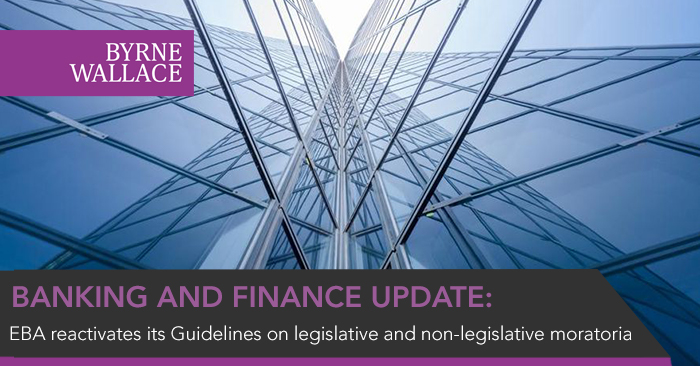EBA reactivates its Guidelines on legislative and non-legislative moratoria
Wednesday, 02 December 2020
The European Banking Authority (“EBA”) announced today, 2 December, that it is reactivating its guidelines on legislative and non-legislative moratoria (the “Guidelines”). The Guidelines were first introduced in April and application of the Guidelines was extended to 30 September 2020. In September, the EBA noted that the Guidelines would not be extended beyond 30 September 2020 causing significant difficulty for borrowers whose activities were severely impacted by the reintroduction of Level 5 COVID restrictions in Ireland in October.
Reactivation of the Guidelines will be greatly welcomed by borrowers, particularly those in the hospitality, leisure, retail and other sectors working to avoid a “forbearance” classification.
While banks/borrowers will be relieved to see the extension of the Guidelines, it should be noted that in addition to the conditionality applicable when the Guidelines first issued (click here to see our update from June 2020) there are two additional constraints being:
(i) an overall cap of 9 months on the period of time for which payments can be suspended, postponed or reduced as a result of the application (and reapplication) of general payment moratoria; and
(ii) a requirement that credit institutions continue to apply their normal policies for the review of indications of unlikeliness to pay, prioritising the assessment of cases where it is most likely that the short term shock caused by the pandemic may transform into long term financial difficult and ultimately, insolvency.
Ireland has seen a prolonged period of closure within certain sectors, particularly the hospitality sector. Therefore, the proposed nine-month time limit may prove problematic for some borrowers/lenders assessing the application of these reactivated Guidelines. For instance, where a business has already availed of a six month moratorium, any additional moratorium entered into after the introduction of the revised Guidelines cannot exceed 3 months.
Borrowers will be particularly interested to note that the Guidelines provide that the classification of a loan as being “in forbearance” during October and November 2020 (where a moratorium was granted but the applicability of the Guidelines had lapsed on 30 September) can be re-visited and potentially reversed. In order for such classification to be reversed it should meet the criteria in the Guidelines (including the additional two criteria noted above). Such a reclassification would be particularly positive for a borrower with plans to expand or incur capital expenditure with Bank funding in the coming years.
It remains to be seen whether the Guidelines will provide sufficient assistance to sectors which have now operated under restricted conditions since early March 2020 or whether a further extension will be required in 2021.
For further information, please contact Elizabeth Ryan, partner from the ByrneWallace Banking and Finance team, or your usual ByrneWallace contact.

